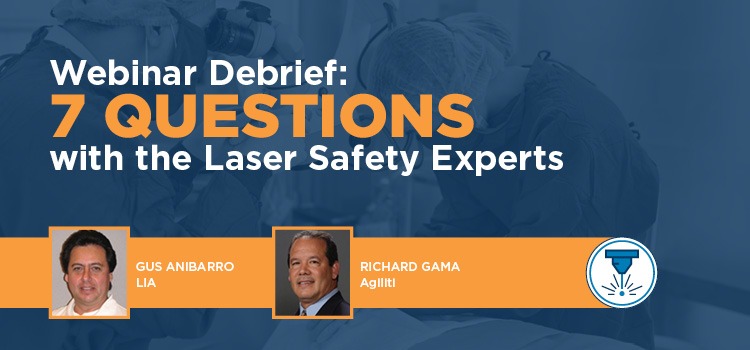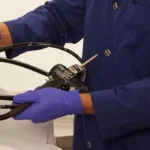During a recent webinar, Agiliti partnered with LIA to break down several key misunderstandings of the new ANSI standards related to medical laser safety in the OR. Part 1 of a 2-part series providing answers to some of the most pressing attendee questions.
Recently, Agiliti hosted a webinar entitled, “No Wizards Required! How to Demystify the Latest ANSI Standards and Improve Your Laser Safety Program.” In it, Gus Anibarro from the Laser Institute, and Richard Gama of Agiliti broke down the new requirements for laser operators and identified the steps operating rooms need to take to be compliant with the updated standards.
We followed up with Gus and Richard on some key ideas that came up during the webinar as well as some of the many questions that came pouring in after. We will address the rest of the questions received in a separate blog post.
Q: Richard and Gus, you just hosted a webinar on ANSI standards for medical laser safety. What are the most important takeaways from it?
Gus Anibarro: I would say the key takeaway is that each facility must have a laser safety officer (LSO) managing the Laser Safety Program. A third-party provider of laser and operator services should not serve as an LSO for the hospital, as oversight and operation are two separate tasks. That said, third-party providers do need to retain and provide useful key performance indicators (KPIs) to assist the facility’s laser safety officer in program oversight and compliance.
Richard Gama: I agree with that. I’d add that the standard specifies that a dedicated person must be assigned to operate the controls of the laser, and the laser operator should not have competing responsibilities. Multiple responsibilities can pull attention from safe use standards designed to protect both staff and the patient.
Q: What types of fines or penalties may be imposed upon the healthcare facilities for not being in compliance with ANSI standards?
Richard: This depends on the circumstances, occurrences and findings. It also depends on who is assessing the situation. Administrative penalties may be assessed against the facility or their officers, depending on the circumstances. In the past, we’ve seen the credential and privileges of departments, chief nursing officers and others get assessed penalties or fines.
Having a strong program in place with a supported laser safety officer is important to keep things going the right way. It also plays a big role in preventing accidents and injuries that draw attention from a regulatory and other state bodies.
Q: Where can facilities get a copy of these ANSI standards?
Gus: There are a couple of places that you can go to purchase any of the ANSI Z136 standards. Since the Laser Institute is the Secretariat and publisher of the standard, they can purchase it from the Laser Institute’s website. Or, they can go to ANSI directly to purchase the standard.
RELATED ARTICLE: Understanding ANSI: What New Standards Mean for Your Operating Room
Q: If a healthcare facility has a hospital as well as a standalone surgery center, can one laser safety officer cover both sites?
Richard: Yes. Some hospitals appoint a laser safety officer to oversee an entire safety program. Others choose to have an LSO at each hospital. With that said, it’s good to have eyes and ears at the other facilities. In this case, appointing a deputy is a wise thing to do as well. However, if there is an LSO at each hospital, there isn’t a need for a deputy laser safety officer.
Q: Can a third-party laser provider be the dedicated operator and count as that designated operator?
Richard: Often in the third-party situation, a laser operator is provided, particularly if the hospital doesn’t have a trained and authorized staff for that specific laser system. In that situation, the third-party provider is well within its role to act as the laser operator, which includes implementing safety procedures.
Whenever a third party comes into an operating room or a facility, that third party is bound by the policies of the facility. It’s important that the hospital staff also knows these policies to help oversee the third-party laser operator during those procedures.
Q: Who can give the authority to the laser safety officer to be able to stop a case if a control measure or standard operating procedure is not followed?
Gus: I get this question all the time because sometimes people think ANSI or the Laser Institute gives the authority. But the truth is that this authority comes from your employer, because ultimately, it’s the employer’s fundamental responsibility to provide a place free of recognized hazards.
The laser safety officer should get the appropriate training and support from the employer to help implement the safety program. One of the things I found from my years of performing audits in hospitals is that most functional laser safety programs had an active laser safety officer who had strong support from their management. On the flip side, those that did not have a good program in place tended to be missing an LSO or the LSO did not have support for management.
Q: I’m a new laser safety officer looking to build a laser safety program that has organizational support. What are some steps that I can take, and who should I include as I form my laser safety committee?
Gus: If you’re starting your safety program and you want to build a laser safety committee, perhaps some people that should be on that safety committee include your biomed tech, any deputy LSOs that you might have, any laser safety site specialists, risk management and the heads of some key departments.
Richard: I think having a broad mix of people, as Gus mentioned, is essential. And in fact, I might add somebody in the credentialing and privileges offices to help establish the procedures and requirements for the users to get privileges and access to the equipment. Additionally, if you use a third-party provider, they would be able to assist the committee in aspects of the program.
Visit our Resource Center to discover more, or return to the blog menu.












